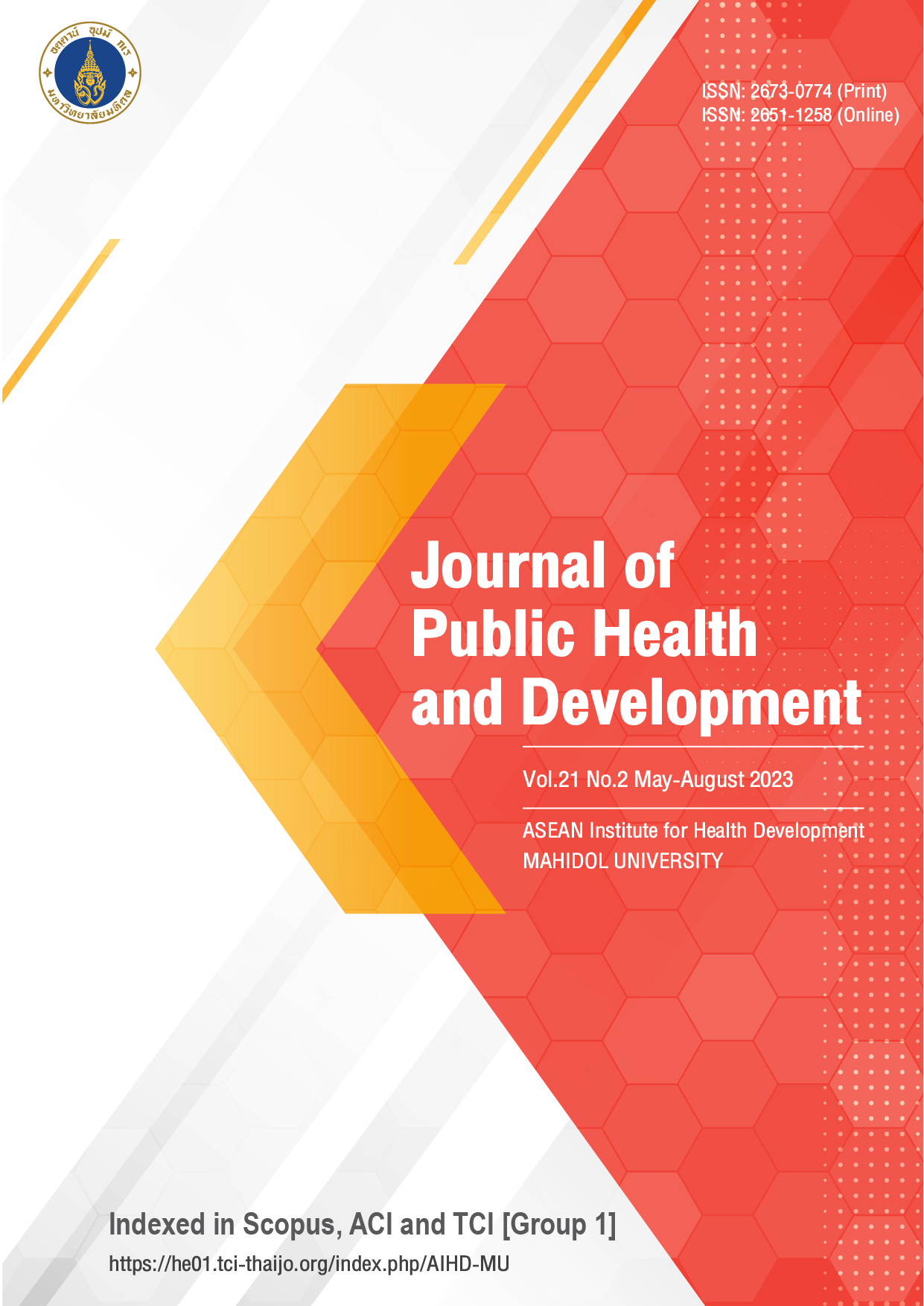Quality of work life (QoWL) among farmers in Thailand 10.55131/jphd/2023/210222
Main Article Content
Abstract
Working conditions and quality of work life reflect a person’s overall quality of life and wellbeing. The purpose of this cross-sectional survey study was to investigate the working conditions, quality of work life, and related factors among farmers. The samples consisted of 445 farmers from the Wang Chin and Song Districts in Phrae Province, Thailand. Data collection was accomplished through a self-administered questionnaire. A structural equation model was specified to investigate the extent to which individual characteristics, interpersonal factors, and working conditions contribute to the quality of work life. More than half of the participants were (52.1%) men; the average age was 48.26 years; the average monthly income was 5,113.48 THB; 89% held debt; and 56.9% were landowners. Farmers’ perceptions of working conditions, namely, the physical, chemical, and ergonomic working environment were poor, and there was a significant risk of workplace accidents. The results revealed that the overall quality of work life among employees was moderate (82.9%). The causal model of the quality of work life was assessed and justified through SEM. The model fits well with the empirical data (GFI = 0.973, AGFI = 0.912, CFI = 0.985, RMSEA = 0.062, SRMR = 0.053). A combination of marital status, relationships with family and peers, social support, the biological environment, and ergonomics explained 23.3% of the variation in the quality of work life. The findings indicate that government organizations involved in agricultural work should work with interdisciplinary groups to improve the quality of farmers’ working lives. It is recommended that a one-stop service center be established in an easily accessible area, as a resource for farmers to store their knowledge and gain inspiration. Farmers should be encouraged to work together to improve their ability to negotiate and the community’s ability to build a sustainable quality of life.
Article Details

This work is licensed under a Creative Commons Attribution-NonCommercial-NoDerivatives 4.0 International License.
References
Kittisuksatth S, Tangchonlatip K, Jaratsit S, Saiprasert C, Bunyatierana P, Aree W. Happinometer: The Happiness Self-Assessment. Institute for Population and Social Research, Mahidol University. 2012.
UNESCO. Indicator of Environmental Quality of Life. Research and Papers in Social Science. 2001.
Office of National Economic and Social Development Council. How many farmers in Thailand? [Internet]. [Cited 2021 Nov 16]. Available from: http://marketeeronline. co/archives/161682.
Bureau of Occupational and Environmental Diseases. Health risks and work-related illnesses in the agricultural industry. Department of Health, Ministry of Public Health. 2016.
Boonyoung K. Peasant’s suicide: state, economic structure and violence. Local Administration Journal. 2015;9(1):1–17.
Setthetham D, Nathapindhu G, Ishida W, Patte T. Risk behavior and factors affecting to health in rice farmers. KKU Journal for Public Health Research. 2013;6(2):4-12.
Yaruang N, Sukonthasarn P. Occupational Safety Behaviors and Health Status among Rice Farmers in Chiang Rai Province. Journal of the Royal Thai Army Nurses. 2016;7(2):163-174.
National Institute Occupational Safety and Health (NIOSH). National health system employers’ health and well-being: Commission occupational health services. [Internet]. [Cited 2023 May 10]. Available from: http://www.niosh.org/safework/areas of work/hazardous.html.
Phrae Provincial Agriculture Office. Important Phrae Province agriculture information [Internet]. [Cited 2021 Nov 16]. Available from: http://www.phrae. doae.go.th/ data/kasad.pdf.
Daniel WW. Biostatistics: A foundation for analysis in the health sciences. New York: John Wiley & Sons. 1995.
Chotchai T, Buajun A, Phadungphol S, Taearak K, Songsri C, Janthasukh S. Quality of life among vegetable production farmers in Mueang District, Khon Kaen Province. Journal of Graduate MCU Khon Kaen Campus. 2020;7(2):204–16.
Albright JJ, Park HM. Confirmatory Factor Analysis using Amos, LISREL, Mplus, SAS/STAT CALIS. Working Paper. The University Information Technology Services (UITS) Center for Statistical and Mathematical Computing, Indiana University. 2019.
Hu L, Bentler PM. Cutoff criteria for fit indexes in covariance structure analysis: Conventional criteria versus new alternatives. Structural Equation Modeling. 1999;6(1):1–55.
Kong FZ, Zhao L, Zhang XB, Tsai CH, Lin DD. Farmers' Work-Life Quality and Entrepreneurship Will in China. Front Psychol. 2019;10:787. doi: 10.3389/fpsyg.2019.00787.
Sinambela WY, Popova EK. Quality of life of farmers in Riau Province, Indonesia. BECTHNK CEBEPO-BOCTOYHOTO. 2020;3(20);43–7.
Sutabutr T, Virasaya J, Satsanguan N, Tinnakul N. The Adaptation and Quality of Life of Farmers in Contemporary Thai Society. Ph.D. in Social Sciences Journal. 2021;10(2): 382–92.
Moda HM, Nwadike C, Danjin M, Fatoye F, Mbada CE, Smail L, et al. Quality of Work Life (QoWL) and Perceived Workplace Commitment among Seasonal Farmers in Nigeria. Agriculture. 2021;11(2):103.
Jamaati Ardakani R. Analysis of social psychological effects (job security and quality of work life) on increasing job satisfaction of saffron farmers in Bafgh city. Saffron Agronomy and Technology. 2019;7(2):275-83. doi: 20.1001.1.23831529.1398.7.2.9.4
Jiao Y, Tang W, Zhou J. Research on work-life quality of farmers in urban areas and its influencing factors-analysis based on a survey of farmers in Pudong new area of Shanghai. Popul Econ. 2008:62–6.
Xu X. Research on factors influencing young farmers’ employment quality. World Surv. Res. 2016:13–8.
Gosetti G. Sustainable Agriculture and Quality of Working Life: Analytical Perspectives and Confirmation from Research. Sustainability. 2017;9(10):1749.
Lakshmi PV, Kumar BR, Kusuma GDV. An Empirical Study on Quality of Work Life among Farmers with Reference to Ranga Reddy District. Telangana State. Asian J Mult-Disciplinary Res. 2018;4(2):19–22.
Wongsatjachock W, Sattayavinit T. Agricultural Welfare and Political Regime:A Comparison between Thailand and Vietnam. Journal of Political Economy. 2020;8(2):79-105.






